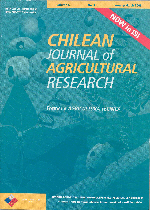
|
Agricultura Técnica
Instituto de Investigaciones Agropecuarias, INIA
ISSN: 0365-2807
EISSN: 0365-2807
Vol. 64, No. 1, 2004, pp. 25-33
|
 Bioline Code: at04003
Bioline Code: at04003
Full paper language: Spanish
Document type: Research Article
Document available free of charge
|
|
|
Agricultura Técnica, Vol. 64, No. 1, 2004, pp. 25-33
| es |
Comparación Entre Grano de Maíz y Trigo Brotado en Raciones de Vacas Lecheras Paridas en Otoño y que Consumen Ensilaje de Maíz
Hazard, Sergio; Rojas, Claudio & Hewstone, Cristian
Resumen
En el Centro Regional de Investigación del Instituto de Investigaciones Agropecuarias-Carillanca se comparó el grano de maíz (Zea mays L.), con grano de trigo (Triticum aestivum L.) brotado, incorporado en el concentrado de vacas que consumían ensilaje de maíz más 4 kg de heno de alfalfa (Medicago sativa L.). Se utilizaron 8 vacas raza Frisón Negro Chileno por tratamiento. Se suministraron 7 kg de concentrado con 64% de grano de maíz (T1), 70% de grano de trigo con alto grado de brotación (T2), 74% de grano de trigo con brotación intermedia (T3) y 69% de grano de trigo ligeramente brotado (T4). Las raciones fueron isoproteicas e isoenergéticas. El diseño experimental fue de bloques completos al azar. No existieron diferencias significativas en producción diaria de leche, con producciones de 24,88; 23,30; 23,77 y 24,88 L d-1 para T1, T2, T3, y T4, respectivamente (P > 0,05). No hubo diferencias en los contenidos de materia grasa, proteína y sólidos totales de la leche (P > 0,05). Los consumos de MS fueron de 17,81; 18,86; 16,46 y 16,32 kg d-1 para T1, T2, T3, y T4, respectivamente; se observó diferencias entre T2 y el resto de los tratamientos. Se concluyó que el grano de trigo con alta brotación, con brotación intermedia y ligeramente brotado se puede utilizar en raciones de vacas lecheras sin afectar la producción de leche ni los componentes de la misma, siendo su respuesta productiva equivalente a la de incorporar grano de maíz la ración.
Palabras-clave
grano de trigo brotado, alimentación de vacas lecheras, Triticum aestivum L., Zea mays L.
|
| |
| en |
Comparison of Kernel Corn and Sprouted Wheat for Diets of Dairy Cows with Autumn Calving and Consumption of Corn Silage
Hazard, Sergio; Rojas, Claudio & Hewstone, Cristian
Abstract
In the Carillanca Regional Agricultural Research Institute, kernel corn (Zea mays L.) was compared with sprouted wheat (Tritricum aestivum L.) incorporated in the concentrate of cows that consumed corn silage plus 4 kg of alfalfa (Medicago sativa L.). Eight Chilean Frison Negro cows were assigned to each treatment. The treatments evaluated were 7 kg of the concentrate 64% kernel corn (T1), 70% highly sprouted wheat (T2); 74% moderately sprouted wheat (T3), 69% slightly sprouted wheat (T4). The rations were isoproteic and isoenergetic. The experimental design was a randomized complete block. There were no significant differences in the average daily milk production with values of 24.88; 23.30; 23.77 and 24.88 L d-1 for treatments T1, T2, T3, and T4, respectively (P > 0.05). There were no differences in contents of fatty matter, protein and total solids of the milk (P > 0.05). Dry matter intake was 17.81; 18.86; 16.46 and 16.32 kg cow-1 for T1, T2, T3 and T4, respectively; a difference was observed between T2 and the other treatments. It was concluded that highly, moderately and slightly sprouted wheat can be used in dairy cow diets without affecting milk production or the composition of the milk, having the same productive response as including kernel corn in the diet.
Keywords
sprouted wheat grain; dairy cows feeding, Triticum aestivum L., Zea mays L.
|
| |
© Copyright 2004 - Instituto de Investigaciones Agropecuarias, INIA (Chile). Free, full-text also available from http://www.inia.cl/at/agritec.htm
Alternative site location: http://www.inia.cl/at/agritec.htm
|
|
